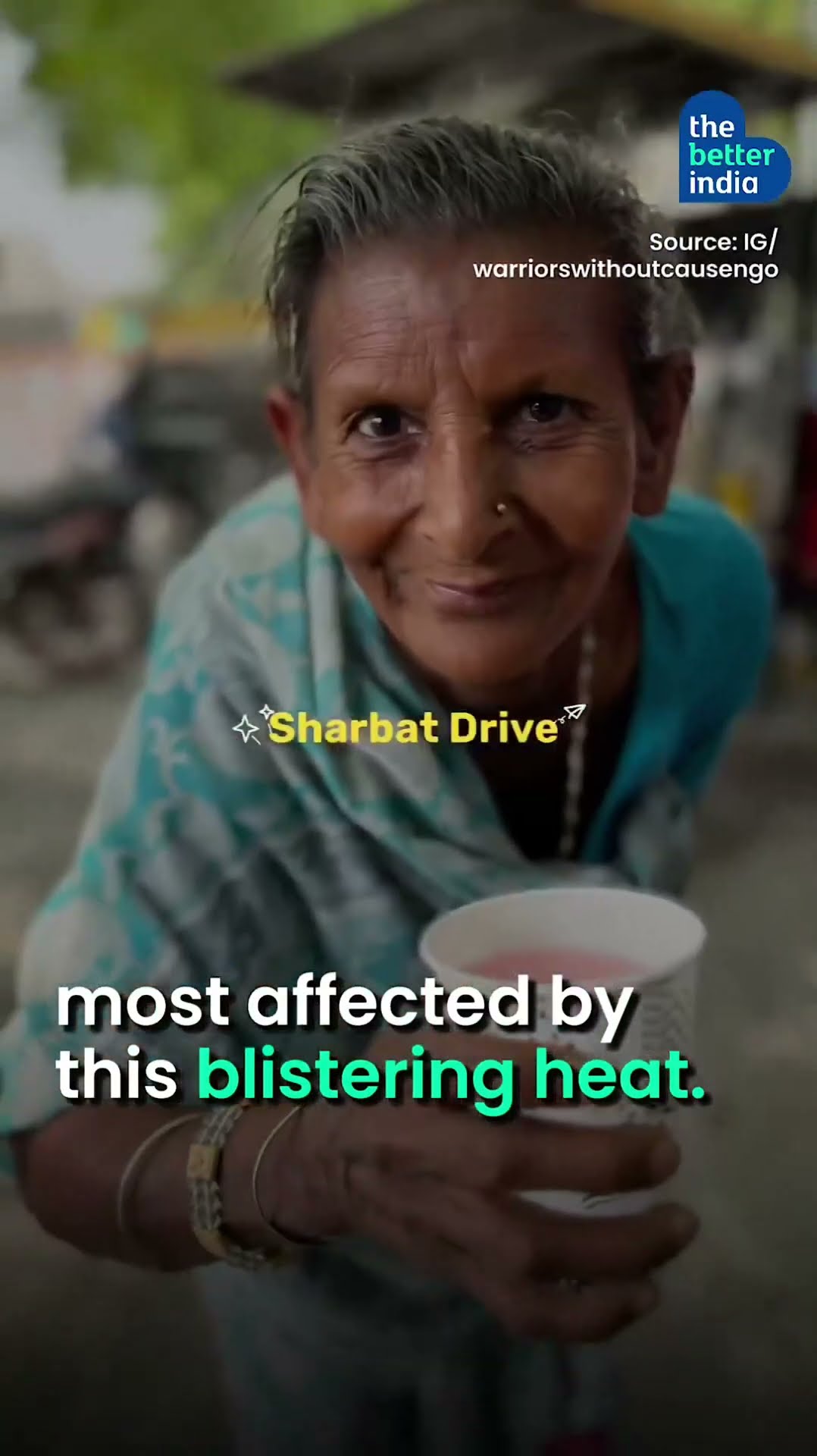Sisters Turn 20,000 Kg Pine Needles Into Handicrafts to Reduce Uttarakhand Forest Fires
In 2021, Nupur and Sharvari Poharkar started ‘PIRUL Handicrafts’ to make useful household artefacts from pine needles found in Uttarakhand. They have employed at least 100 rural women from nearby villages like KhetiKhan, Tyarsun, Patan and more.
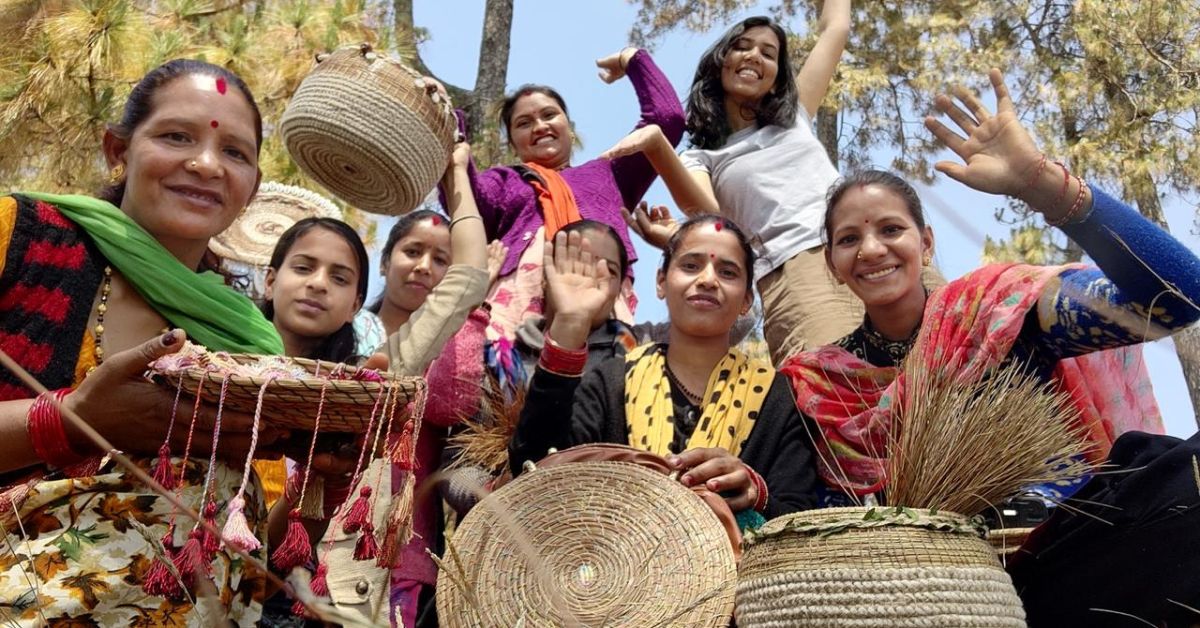
Since April this year, at least five people in Uttarakhand have lost their lives in the raging forest fires that have spread over 1,000 hectares. Amid the danger of the blaze fanning out to heavily populated areas, the state’s forest department has initiated remedial measures of putting firelines to control it.
While the state government is taking several measures to control the fire, an army of 100 rural women in Champawat has taken up the responsibility to work on the root cause – pine tree waste.
Historically, the accumulation of pine needles on the forest floor has been a major reason for spreading fires in the region. Over 71 percent of Uttarakhand’s land is forested and pine trees – locally known as Chir ka ped – cover about 16 percent of the forest area in the state.
“Uttarakhand has an abundance of pine trees. They shed needles which keep accumulating year after year which are highly flammable. Even half-lit cigarettes or burnt agricultural waste can lead to these pine needles catching fire very easily and spreading in no time,” Nupur Poharkar tells The Better India.
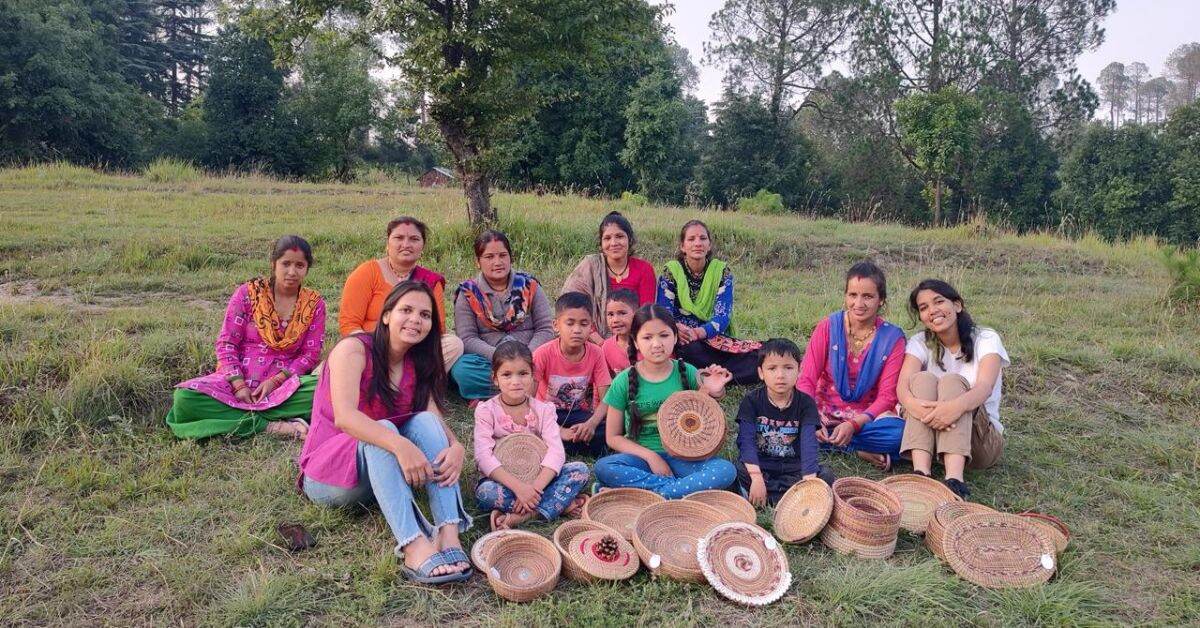
Taking heed of this urgent situation, Nupur, along with her sister Sharvari, started ‘PIRUL Handicrafts’ to make artefacts from pine needles. With the help of 100 rural women, the startup has been able to divert 20,000 kg of pine waste into useful products.
Filling two needs with one deed
Nupur, who is a veterinary doctor, was always motivated to work in the social sector. Her dream came true in 2020 when she got a fellowship opportunity in Champawat, Uttarakhand.
“As part of this, I was expected to identify the problem in the village and suggest ways to solve it. I observed how men migrate to cities for better jobs whereas women are shouldered with responsibilities to look after their livestock and farm. Sadly, this work would get affected because of the frequent forest fires,” the 28-year-old shares.
During her fellowship, Nupur witnessed a fire breaking out in the backyard of her neighbour’s house. Sharing her experience, she says, “These villagers spent hours collecting fodder for their cattle which the fire burnt down. I saw them crying their hearts out while others rushed to put off the fire.”
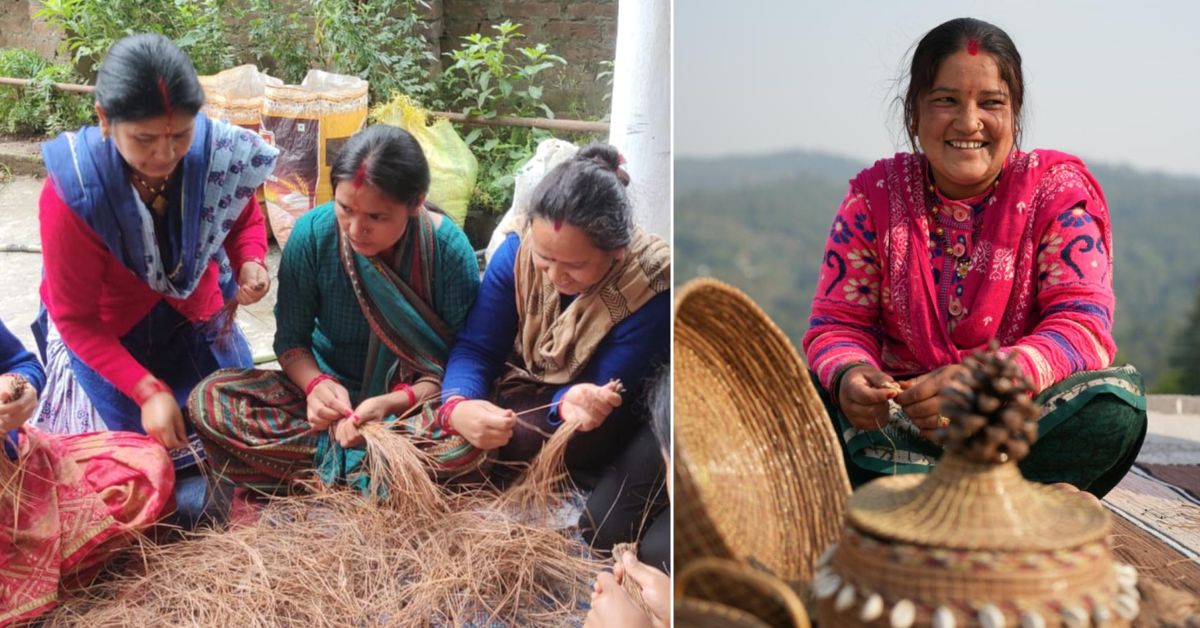
“Although this was just one incident, these villagers narrated other instances which turned quite serious and scary. Not only did they lose harvested fodder but also sometimes lost livestock and the surrounding biodiversity. The government on the other hand spends huge sums every year to control the forest fires but not much has been done to solve the issue of such fires caused by pine waste,” she adds.
To fill these gaps, the Delhi resident started looking for potential solutions to utilise pine waste and generate livelihood opportunities for rural women.
In 2021, she came across a YouTube video on crafts made out of pine needles. “It’s not a very common craft. There are only a few villages in Himachal Pradesh that are actively making these products from pine waste,” she shares.
After discussing with her sister, who is a designer, Nupur zeroed in on making craft items out of pine waste.
A small step towards a big issue
After launching their startup ‘Pirul Handicrafts’, Nupur and Sharvari mobilised the villagers to collect pine waste from nearby forests. “After collecting these pine needles, we clean and soak them in water for some time. Thereafter, we make simple products like tea coasters using the coiling technique. Historically, coiled baskets made from this technique are either hay or grass-based,” she shares.
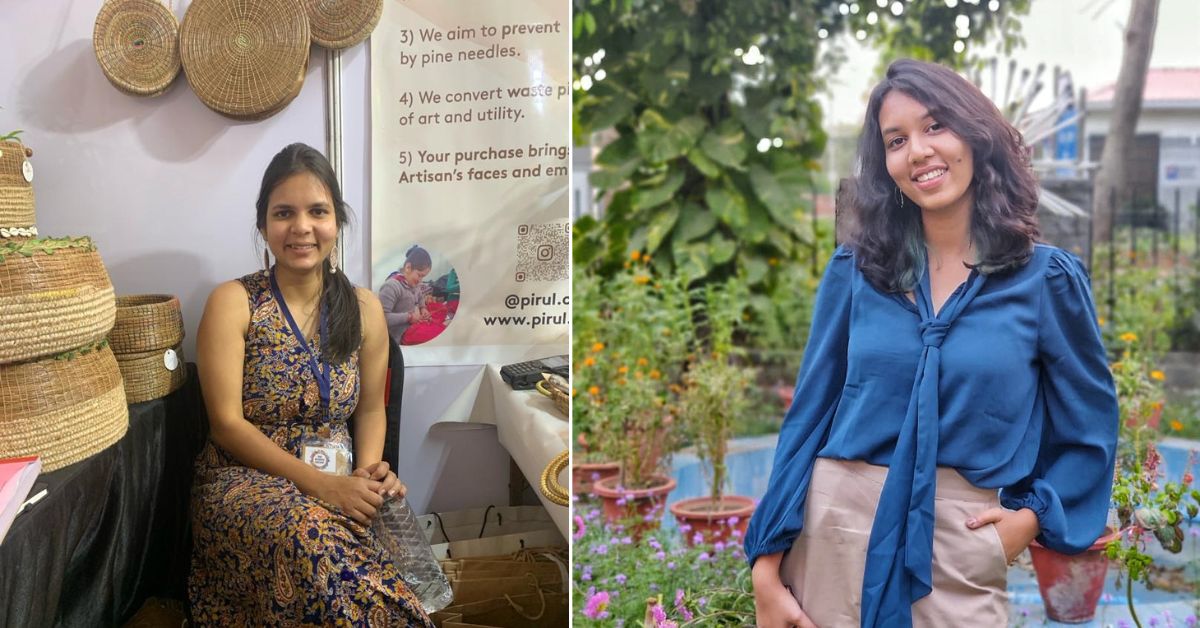
Currently, the team manufactures various handicraft products like tea coasters, earrings, storage boxes, handbags, serving trays, table mats, and planters.
Starting with 15 women initially, the team has expanded to 100 women from seven villages like KhetiKhan, Tyarsun, Patan, Chaanmari, Panda, Paati, and Jhulaghat.
Sunita Moni, who has been working with the startup for the past three years, tells The Better India, “Earlier, I used to rear livestock and grow wheat and paddy on two bigha of our land. Often, we would incur huge losses because of forest fires that would burn down our crops, fodder for our cows, even houses, and dry water resources.”
“I didn’t know that pine waste can be turned into beautiful craft items. It is exciting to make new designs every day. With this, my monthly income has also increased from Rs 1,500 to Rs 5,000. As a result, I was able to enrol both of my kids in private schools. Over these years, I also saved some of this amount to buy one tola (nearly 12 grams) of gold to secure the future of my children,” she adds.
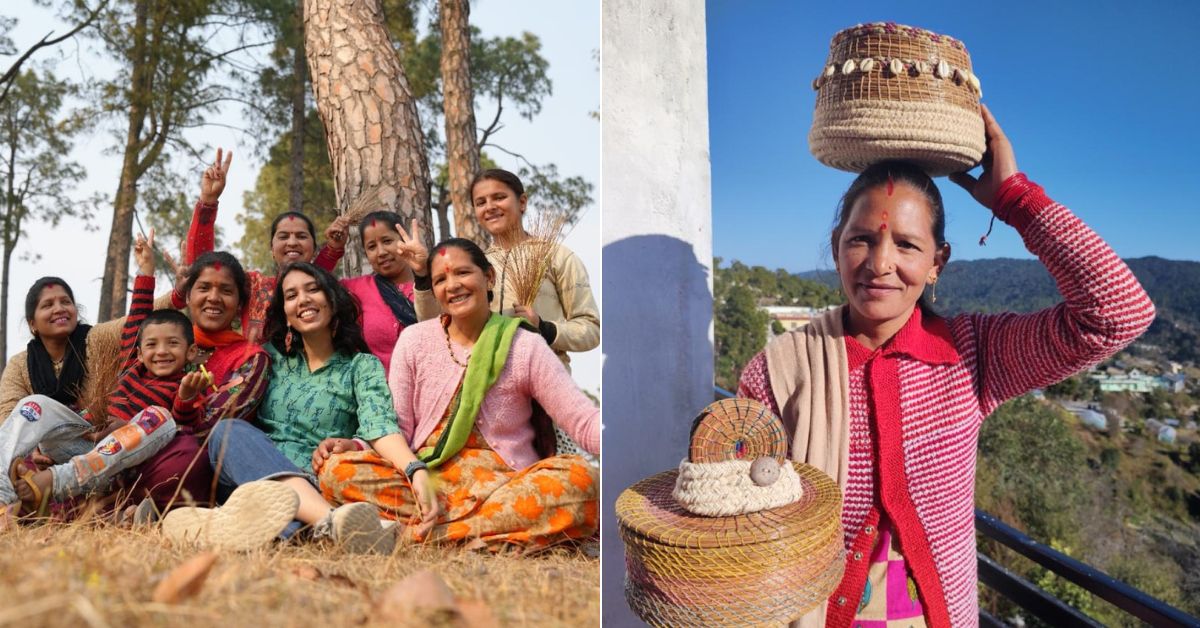
As of now, these rural women have sold about 12,000 products and have established a large customer base in Bengaluru, Delhi, and Hyderabad cities in India, and the US.
“While the social angle is one of the contributing factors, our products have also become popular for their durability and better finish compared to other eco-friendly products like bamboo. While bamboo products are prone to fungal attack, there is no such worry in pine needle products as they are naturally-resistant to fungus,” she says.
Looking at the impact of their startup, Nupur says, “We are able to contribute towards society in a positive way. Interestingly, we have not observed any forest fires as of yet in the areas from where we collect pine needles. Earlier, at least three incidents were reported every year.”
“We have diverted 20,000 kg of waste to something useful. This is a small step towards a big issue but it can be replicated in other areas of the state to reduce the root cause and frequency of forest fires,” she adds.
Edited by Padmashree Pande; All photos: Sharvari Poharkar
Sources:
5 dead in Uttarakhand wildfires, over 1,000 hectares of forest destroyed: By Ankit Sharma for India Today, published on 6 May 2024.
Under-age chir pine trees being illegally extracted for resin in U’khand: By Shivani Azad for Times of India, published on 4 September 2023.
If you found our stories insightful, informative, or even just enjoyable, we invite you to consider making a voluntary payment to support the work we do at The Better India. Your contribution helps us continue producing quality content that educates, inspires, and drives positive change.
Choose one of the payment options below for your contribution-
By paying for the stories you value, you directly contribute to sustaining our efforts focused on making a difference in the world. Together, let's ensure that impactful stories continue to be told and shared, enriching lives and communities alike.
Thank you for your support. Here are some frequently asked questions you might find helpful to know why you are contributing?









